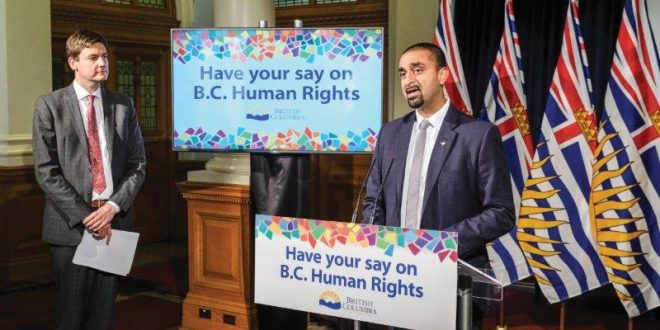Meet Ravi Kahlon, the field hockey player who was recently elected as an NDP MLA from North Delta. Kahlon is the Provincial Secretary for Sport and Multiculturalism in the recently form provincial government under Premier John Horgan. Fifteen years after it was dismantled by the B.C. Liberals, the new government has announced plans to reinstate the B.C. Human Rights Commission. Kahlon has been assigned an important role in the re-establishment of this Commission. In an interview with Desi Today, Kahlon talks about his journey from the hockey fields to the field of politics. He also elaborates on the importance of human rights commission and what people can expect from it. Kahlon is a certified coach and mentor to many youth in North Delta, and spends time coaching field hockey and soccer. He lives in North Delta with his wife Lily, and son Naven.
By Surbhi Gogia
Please tell us something about your family and early life?
I was born and raised in Victoria. When I was four-years-old my father lost his job and my parents went through a rough period. So me and my sister went to live in India for some time. After completing my first year school in India and I came back to Victoria. I did my schooling and education from there. I moved to Delta in about 2004 and since then North Delta has been my home.
You have been a two time Olympian in sport for Canada’s field hockey team and have been inducted into the Delta Sports Hall of Fame. How did you develop interest in this sport?
I was introduced to hockey by my grandfather and my father. They both were seasoned players. My grandfather played for the Navy team in India. My father too was very competitive. As an immigrant family we all grew up with different life experiences. My grandfather grew up during world wars and partition time. My father saw both the lives as a Canadian and Indian and I was a kid born in Canada. But it was hockey that brought all of us on same page. Only through hockey we could communicated in one language. It was our way of bonding with the family. I would always go to the field with my father, grandfather, my brother and sister to play hockey.
Currently there is much awareness and lots of field hockey teams. But when you started playing how difficult was it and what were some of the problems that you faced?
When I started playing with my father in Victoria, there were no boys team playing there since there was a small community. But I really wanted to play so I played for one year in an all girls team who were couple of years older to me. And then slowly boys started signing up and it developed from there. But in early days there weren’t many boys playing. Some of the high schools on the Island did have boys team but not as many as compared to Vancouver.
Where did life take you from there?
I played on the national teams and competed in two Olympics for Canada. I went to school and university in Victoria and went into banking. I worked there for seven years and from banking I was hired into the legislature to do policy work for elected officials.
How did you get into politics?
I grew up seeing my family’s involvement in the community. My grandfather and his friends took the initiative to start the first ever senior centre for Punjabi community in Victoria. My grandfather would take me to get the petitions signed. I still remember dropping off flyers on doors as a young boy. That was my first introduction to politics as a little kid. Then I went to follow my career path. But I always had that calling in me.
It was during my days in the banking that it struck me hard. One day I received an application for a home loan. Six people from one family, were applying for one loan for a town house. And I had to tell them that they could not qualify. It hit me at that moment that we were supposed to be living in one of the best countries of the world. And at this place, 6 people cannot qualify for one mortgage. It hit me hard. Then I started reading more about housing, I went to attend a rally. I went to the Fraser Institute which is a think tank, to find out more about housing. They were debating about how economy’s growth should be linked to people’s growth. That got me more involved because I used to think on the same line. Then I met Harry Bains and Sue Hammel eventually started getting more involved.
The BC government has decided to reinstate B.C. Human Rights Commission? Can you tell us something about the decision?
B.C. is the only province without a human rights commission, and one is needed to address issues of systemic discrimination and inequality that are prevalent throughout the province. B.C. Attorney General David Eby has been assigned with the task of re-establishing the commission. I have been given the responsibility to make a report. Right now I am in the process of traveling in the province meeting community groups and listening to what they want the Commission to be like. I will be making a report and presenting it to the Premier and the Attorney General by the end of this year.
We have some major issues in our society that need to be addressed. For example studies suggest that women are not being paid anywhere closer to men for the same amount of work they do. We have been talking about these things for a long time. The Human Rights Commission’s role in such cases will be to do research and give advice to the business community on how to close that gap.
BC is the only province not to have Human Rights Commission. How are other provinces doing with its presence and how it is making a difference in the lives of people?
There is no doubt many provinces are doing better than B.C. Ontario, for example, is making huge advancement on addressing racism because they have anti-racism strategy on diversity in work force. There are also other issues. B.C. has got the widest income gaps, highest child poverty rate in the country etc.
The previous commission was dismantled in 2002 in favour of a complaint-driven tribunal . The Tribunal is responsible for accepting, screening, mediating and adjudicating human rights complaints. The Tribunal offers the parties involved the opportunity to resolve the complaint through mediation. If the parties do not resolve a complaint and the complaint is not dismissed, the Tribunal holds a hearing. A human rights commission can work to promote, protect and advance human rights through research, education and policy development. The simple way to describe is that when society gets sick tribunal works as the doctor. What we want is a Commission to protect the society from getting sick.
How can civilians participate in the process?
From Sept. 20 through Nov. 17, 2017, British Columbians are encouraged to share their experiences and ideas on how a human rights commission can promote and protect the principles of dignity and equality in the province.
Public engagement is being conducted through a dedicated website http://engage.gov.bc.ca/bchumanrights/. Here weekly discussion questions will drive ongoing conversation and provide an outlet for written submissions. Additionally, I will be holding meetings throughout the province with various organizations and interested parties.
Some people who do not want to engage through meetings or website can just write the issue on a piece of paper, walk into their local MLA’s office. The respective MLA will deliver that paper to us on your behalf.
For the detailed interview, please grab the latest edition of Desi Today
 Desi Today Magazine
Desi Today Magazine




